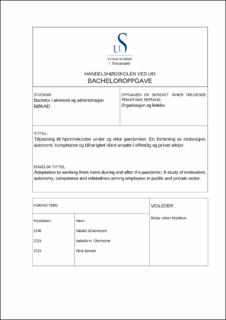Tilpasning til hjemmekontor under og etter pandemien: En forskning av motivasjon, autonomi, kompetanse og tilhørighet blant ansatte i offentlig og privat sektor.
Bachelor thesis
Permanent lenke
https://hdl.handle.net/11250/3073650Utgivelsesdato
2023Metadata
Vis full innførselSamlinger
- Studentoppgaver (Business) [1035]
Sammendrag
Vi har gjennom denne bacheloroppgaven undersøkt hvordan ansatte har opplevd hjemmekontor, og hvordan det har påvirket motivasjonen. Vi har tatt utgangspunkt i selvbestemmelsesteorien til Ryan og Deci, og hovedfokuset er rettet mot de tre psykologiske behovene: autonomi, kompetanse og tilhørighet. Gjennom fysiske intervjuer har vi samlet inn en stor mengde data, og disse dataene har hjulpet oss i å besvare vår problemstilling:Hvordan påvirker opplevelsen av autonomi, kompetanse og tilhørighet motivasjonen under perioden med hjemmekontor, og hvilken rolle spiller selvbestemmelsesteorien i å forklare denne sammenhengen?Det overordnede svaret er at motivasjonen ikke har blitt påvirket, men at formen for motivasjon har forandret seg. Noen har en bedre forståelse for hva som motiverer dem, mens andre har funnet ut at hjemmekontor ikke fungerer for dem og at de er mer motivert på arbeidsplassen. Vi har funnet at økt autonomi og fleksibilitet har hatt en positiv innvirkning på motivasjonen til de ansatte. Derimot ser vi både positive og negative effekter på ansattes mulighet til å anvende og utvikle sin kompetanse. Samtidig har den reduserte fysiske sosiale kontakten vært merkbar under pandemien, og er en god grunn til å argumentere for at fullt hjemmekontor ikke dekker de tre grunnleggende psykologiske behovene som er definert i selvbestemmelsesteorien. En ny hverdag – hybrid kontor er derfor en god kombinasjon som gir de ansatte den fleksibiliteten og friheten de ønsker, samtidig som fysisk tilstedeværelse sørger for at de ansatte knytter bånd til medarbeidere og arbeidsplassen, og som gjør at de føler en tilhørighet til virksomheten. De tre psykologiske behovene, herunder autonomi, kompetanse og tilhørighet, er derfor viktige elementer i å forklare hva som påvirker ansattes motivasjon under perioden med hjemmekontor. Through this bachelor thesis, we have examined how employees have experienced working from home, and how that has affected their motivation. As a starting point we have used Ryan and Decis self determination theory, focusing on the three psychological needs: autonomy, competence and belonging. Trough physical interviews, we collected a large amount of data, this helped us answer our thesis statement: How does the experience of autonomy, competence and belonging affect motivation during home office, and what role does the self determination theory play in explaining the connection/context? The overall findings show that overall motivation is not affected, however they have a different kind of motivation when working from home. Some have a better understanding of what motivates them, while others have found that home office does not work for them, and they are more motivated in the workplace. We found that increased autonomy and flexibility had a positive impact on employees' motivation. On the other hand, findings show there were both positive and negative effects to employees' opportunities to utilize and develop their competencies. Furthermore, the reduced physical social contact was noticeable during the pandemic, and one can argue that working from home full time does not meet the three basic psychological needs defined in Ryan and Decis self determination theory. The new normal - the hybrid office is therefore a good combination providing employees with the flexibility and freedom they want, as well as the need for physical presence. This ensures that employees feel a bond with their colleagues as well as the workplace, which in turn creates a sense of belonging. The three psychological needs autonomy, competence and relatedness in Ryan and Decis self determination theory, are therefore important elements in explaining what affects employees motivation during home office.
